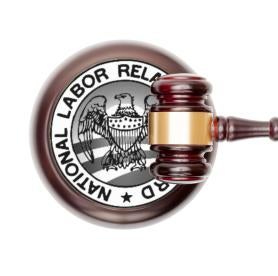The AFL-CIO has sued the National Labor Relations Board (NLRB) to stop implementation of changes to NLRB representation case procedures involving its blocking charge policy, the voluntary recognition bar doctrine, and its rule regarding National Labor Relations Act (NLRA) Section 9(a) recognition in the construction industry. American Federation of Labor and Congress of Industrial Organizations v. National Labor Relations Board, 20-CV-01909.
The final rule was to be effective on May 30, 2020, but the NLRB changed it to July 31, 2020, due to “the ongoing national emergency caused by the coronavirus…”
The lawsuit seeks a declaration that the Final Rule violated the Administrative Procedures Act (APA), and therefore, it should be vacated and set aside.
Blocking Charge Policy
The majority of the lawsuit contains allegations against the blocking charge rule change.
A “blocking charge” is an unfair labor practice (ULP) charge alleging unlawful conduct, which, if true, might interfere with employees’ ability to make a free and uncoerced choice of representative.
Currently, if a “blocking charge” is filed by the union that filed the representation petition, the NLRB will suspend processing of the petition. Then, the election or its results can be delayed for months or years.
Refining its blocking charge policy, the NLRB noted, among other criticisms, “the potential for abuse and manipulation of that policy by incumbent unions seeking to avoid a challenge to their representative status.” The NLRB agreed with comments received on the proposed rule “that the blocking-charge policy impedes, rather than protects, employee free choice.”
Therefore, it will implement a “vote-and-impound” procedure. Petitions will continue to be processed, and elections held as scheduled. If the ULP charge is not resolved before the election, the ballots would be cast, but will be impounded until the ULP charge is resolved or withdrawn, or until 60 days pass without a ULP complaint issuing. (In general, a ULP complaint will issue when a determination is made, after the ULP charge is investigated, that there is reasonable cause to believe the ULP charge allegations.)
The union alleges, among other things, that the data upon which the NLRB based its proposed blocking charge rule contained errors and that the NLRB made some erroneous factual statements in support of the proposed rule. The union also claims that, in the Final Rule’s preamble, the NLRB admitted it had made some errors, but it did not correct them. The union also alleges the Final Rule contains revisions that were not in the proposed rule, a violation of the APA.
Voluntary Recognition Bar
The NLRA permits an employer to voluntarily recognize a union that has the support of the majority of the employer’s employees (instead of having been selected by a majority of the employees voting in an NLRB representation election). The NLRB’s “voluntary recognition bar” policy requires employees to wait a “reasonable period of time” (at least six months) after the date of the parties’ first bargaining session, and no more than one year after that date, before seeking to oust a union voluntarily recognized as their bargaining representative.
Under the NLRB’s Final Rule, employees will have 45 days following an employer’s notice of voluntary recognition of a union to file a petition for an election to determine whether a majority of the employees wish to be represented.
The NLRB also decided the employer or the union must notify it that recognition has been granted. The notice must be posted in conspicuous places and be distributed to unit employees electronically, if that is how the employer customarily communicates with its employees.
The AFL-CIO alleges this rule “would be inconsistent with the Board’s statutory duty to remain strictly neutral in relation to employees’ choice whether or not to be represented.” It noted the NLRB “does not require notice to employees of their right to change their minds about the exercise of their rights in any other context.”
Section 9(a) Recognition in Construction Industry
Under Section 8(f) of the NLRA, an employer primarily engaged in the construction industry may enter into a collective bargaining relationship with a union without receiving proof of employees’ desire to unionize. As a result, that bargaining relationship cannot bar a petition for an NLRB election. Employees or other unions may file an election petition at any time during an 8(f) relationship. Further, either party to an 8(f) contract may terminate the collective bargaining relationship upon contract expiration. By contrast, in Section 9(a) relationships, unions enjoy an ongoing presumption of majority support, even following contract expiration.
Under the NLRB Final Rule, and “[i]n the interest of restoring protection of employee free choice in the construction industry,” contract language claiming majority employee support creating (9)(a) recognition alone will no longer be able to convert an 8(f) relationship to a 9(a) relationship. Instead, “positive evidence of majority union employee support” will be required. The Final Rule overrules Staunton Fuel & Material, 335 NLRB 717 (2001), which held the parties’ contract language may be sufficient to prove and establish a binding 9(a) bargaining relationship.
The union alleges that, in the Notice of Proposed Rulemaking, the NLRB did not seek to overrule Casale Industries, 311 NLRB 951 (1993), in which the NLRB held that there is a six-month statute of limitations on challenging a construction-industry union’s majority status, but did overrule the decision in the Final Rule.
The union also challenged the NLRB’s more sweeping NLRB representation case rule. For more on those changes, see our blog post, Despite Court Ruling, NLRB Implements Much of New Election Rule. The District Court for the District of Columbia had invalidated parts of the rule in that case. For more on the court’s decision, see our blog post, Judge Rejects AFL-CIO Effort to Invalidate Entire Election Rule. It remains to be seen whether the same will be the case here.





 i
i

